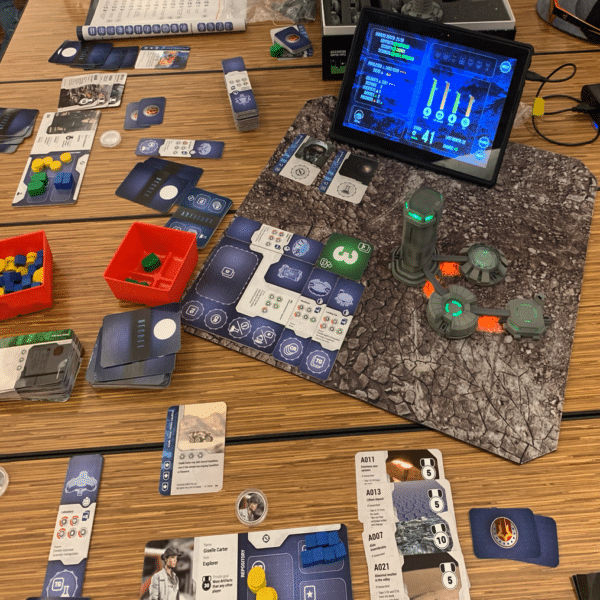First Look at Beyond Humanity:Colonies
The Game
Beyond Humanity:Colonies, an upcoming board game Kickstarter (tentatively late October, 2019) project from Three-Headed Monster, appeared at Gencon 2019 and I played a game with the designers. This is not a review because the game is not completed and some of the elements I experienced may change. The rulebooks, miniatures, tokens and cards are still in flux.
Beyond Humanity:Colonies makes the players managers of a new human colony on a distant planet. Each manager has an area of expertise. One manager is security/military focused, while my manager focused on exploring the planet and collecting artifacts. This specialization gives them bonuses on specific activities. On their turn, players gather resources (money, goods from Earth, decree cards) or spend resources to upgrade the colony. Upgrades are either modules added to the colony (greenhouse, marine barracks) or use your turn to pass a law. Players use “decree” cards to either build a building (eg, you need six decree cards to get a building “approved.”) or each decree card has a law on it you may try to pass. Green decree cards are easier to pass (lower the tax rate) and red are harder (increase the work week).

The game’s goal is to create a successful colony while at the same time increasing your own status among the colonists. While reducing the work week makes you popular, it also decreases colonial productivity. This is where the game diverges from the usual resource management board game. Most games of this type have some status board with colonist happiness and output tracked with meeples. Players take actions to adjust these statistics up and down and everyone can see the status of the colony mood. FYI, you can collectively lose the game if you make poor decisions.
The Tech
Rather than status boards, Beyond Humanity:Colonies has an inscrutable AI.
The tower in the center of the board is “The Ark.” It is a bluetooth-enabled microprocessor with a neural network loaded on it. The neural network simulates thousands of individual colonists, each with 27 different characteristics. Some are more religious than others or want more luxury goods. In order to win this game, you need to keep them as happy as possible, while keeping the colony economically viable and yourself ahead in victory points.
Undoubtedly you are looking at the picture above and thinking you need to hit buttons on the tablet to run the game. Not the case. While you do have to click through some screens each round, you actually play cards and “The Ark” records them. The tablet is just a status board. Each card and your player token has a Near-Field Communication chip in it and the Ark has a wireless reader. You just tap your card to the Ark and then your player token and it records you as taken that action. For example, I want to pass a decree to lower taxes. I tap the “Lower Taxes” decree card, then my token and at the end of the turn the AI decides how everyone votes.
Players create structures to add to the colony and influence the player’s popularity. Adding decree cards to other player’s buildings is allowed, but only one player owns the building and gets credit for it. (You can see the building cards in the lower left of the board image above.) Once you allocate enough decree cards, the building goes on the board. There are 32 building models in the box and they connect to the Ark using corridors. Once the building connects, it tells the Ark it is active and the app updates with the new building. Each building has a unique impact on the colony. For example, the “Industrial Dome” adds to your industrial output, but lowers security and happiness. An operational building also adds more options to acquire good or take other actions on your turn. The video above shows what the game looks like when it is learning new buildings.
Another unique aspect of this game is the shared universe. The Ark pulls a planet from a procedurally generated galaxy that all players share. If you land on a planet first, you get to name it. It is possible for someone else to come along and setup on your planet! The existing colony impacts the new colony in quantifiable ways, such as increasing your output or trade. There is also a mechanic to touch the Arks from two games together to join a cooperative Mega-corporation. I did not see these elements in action, but they are planned for the final release.
The End Game
After 30 turns (took me about 1 hour 45 minutes) the AI determines how well the colony is doing , what you built and how the people feel about your management style. It then determines a winner. I got second place out of three, but it was closer than I thought.
The Bottom Line
This is fascinating combination of technology with a board game. It never felt like I was playing a video game, just a board game with a digital adjudicator. If you are interested the Kickstarter is tentatively scheduled for October and the shipping data is around June, 2020. If you want more information, check out this link.
Trask, The Last Tyromancer